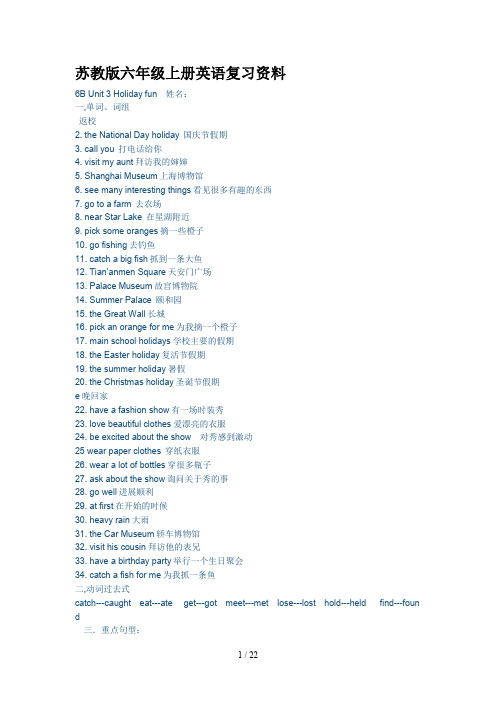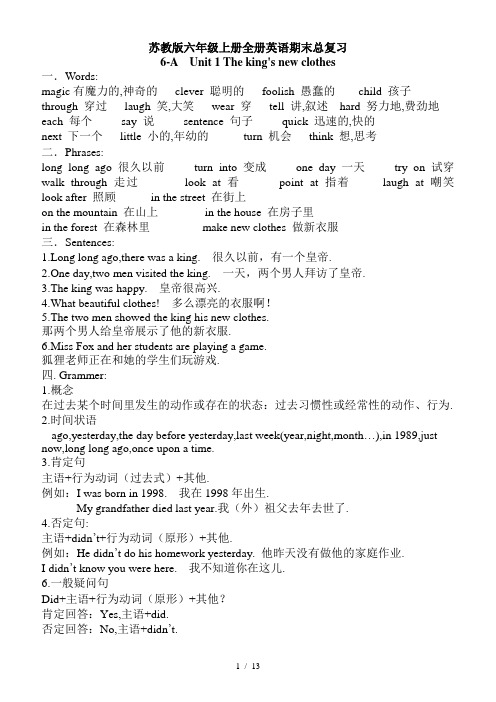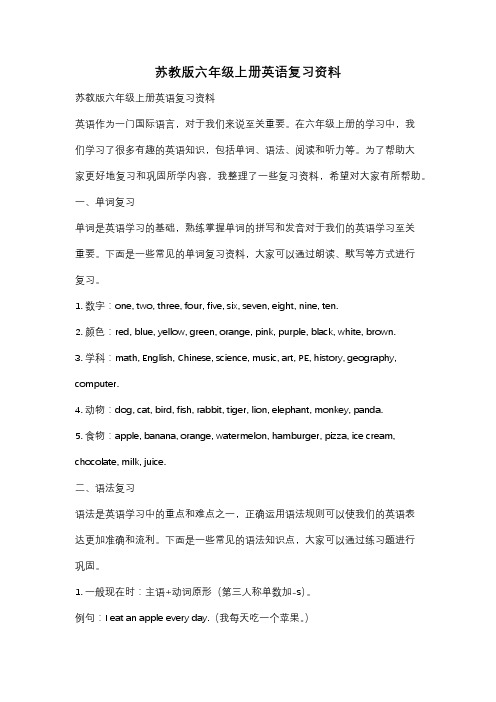苏教版六年级英语上复习
- 格式:docx
- 大小:27.31 KB
- 文档页数:23

苏教版六年级上册英语复习资料6B Unit 3 Holiday fun 姓名:一,单词、词组返校2. the National Day holiday 国庆节假期3. call you 打电话给你4. visit my aunt拜访我的婶婶5. Shanghai Museum上海博物馆6. see many interesting things看见很多有趣的东西7. go to a farm 去农场8. near Star Lake 在星湖附近9. pick some oranges摘一些橙子10. go fishing去钓鱼11. catch a big fish抓到一条大鱼12. Tian’anmen Square天安门广场13. Palace Museum故宫博物院14. Summer Palace 颐和园15. the Great Wall长城16. pick an orange for me为我摘一个橙子17. main school holidays学校主要的假期18. the Easter holiday复活节假期19. the summer holiday暑假20. the Christmas holiday圣诞节假期e晚回家22. have a fashion show有一场时装秀23. love beautiful clothes爱漂亮的衣服24. be excited about the show 对秀感到激动25 wear paper clothes 穿纸衣服26. wear a lot of bottles穿很多瓶子27. ask about the show询问关于秀的事28. go well进展顺利29. at first在开始的时候30. heavy rain大雨31. the Car Museum轿车博物馆32. visit his cousin拜访他的表兄33. have a birthday party举行一个生日聚会34. catch a fish for me为我抓一条鱼二,动词过去式catch---caught eat---ate get---got meet---met lose---lost hold---held find---foun d三.重点句型:1. What did you do for the holiday?2. How was your holiday? It was great fun.3. Why did you call me?Because I wanted to give the fish to you.4. What great fun!5. It is time for dinner.拓展:1. excited / exciting I’m excited at the exciting running race.专项训练四,练习一、单项选择( ) 1. What did you do _______ your holiday?A. toB. withC. for( )2. He _______to the cinema every Sunday morning.A. goB. goesC. going( )3. We _______ in the cinema yesterday.A. wasn’tB. didn’tC. weren’t( )4. I called you ________ I wanted to give you the fish.A. aboutB. ofC. because( )5. ______ there ________ fruit trees on the farm?A. Were, anyB. Are, anyC. Are, some( ) 6. Look! He ‘s____________ about the show.A. excitedB. excitingC. excite( ) 7. Jack came ________ home at five this afternoon.A. back toB. backC. to( ) 8. - The parrot can speak to me on the show.-_____________A. Thank you very much.B. That’s a good idea.C. What great fun. ( )9. Did Sam ______ paper clothes yesterday afternoon?A. woreB. wearC. wearing( ) 10. The show went _______________.A. goodB. niceC. well二、完成句子。

苏教版六年级上册英语复习资料近年来,随着国际交流的增加,学习英语变得越来越重要。
为了帮助小学生们更好地掌握英语,提高英语阅读、听力、口语和写作能力,苏教版出版了一系列英语教材,其中包括六年级上册的英语教材。
本文将针对苏教版六年级上册英语教材,提供一些复习资料和建议。
一、听力练习英语学习的第一步就是听力,因此,我们需要充分利用教材中的听力材料。
可以上网搜索相关的听力材料,也可以自己制作录音材料,并试着回答问题。
在练习听力时,我们应该注意以下几点:1. 注意听讲者的语音和语调,并适应对方的语速。
2. 仔细听讲者说的话,尽量理解。
3. 在追求准确理解的同时,逐渐加快自己的听力速度。
4. 学会依靠上下文猜测单词的意思。
二、阅读练习阅读是学习英语的另一个重要步骤。
多读英语小册子和故事书能够帮助我们获得更多的单词和句型,从而提高英语水平。
阅读时,我们应该注意以下几点:1. 根据需要划分资料,有助于阅读速度和准确性。
2. 在遇到难懂的单词或句子时,可以先跳过去,之后再回来慢慢读。
3. 如果遇到生词,可以在第一次读的时候记录下来,之后再查字典,这样可以保持阅读流畅。
三、口语练习口语练习可以帮助我们运用学到的知识,加强记忆,并提高语音语调和自信心。
可以在课余时间尝试自己说英语,也可以参加学校举办的英语口语角或者跟家人、朋友进行英语交流。
当然,需要注意以下几点:1. 不必强求一口流利的美式或英式英语,重要的是要让人听懂你说的话。
2. 在练习时,不必把语法和发音等问题挂在心上,让自己更放松自由地表达。
3. 在练习时,可以一直说同一个话题,如“我的家庭”、“我的学校生活”等等,这样可以在不同的角度和语言上,多次重复一些基本的英语句型,从而提高熟练程度。
四、写作练习写作是提高英语能力的一个重要途径。
写作可以帮助我们更好地理解和运用语法知识,增强书面表达的能力。
可以尝试写一些简单的英语作文,如简单的日记、卡片、演讲稿等等。

苏教版六年级上册全册英语期末总复习6-A Unit 1 The king's new clothes一.Words:magic有魔力的,神奇的clever 聪明的foolish 愚蠢的child 孩子through 穿过laugh 笑,大笑wear 穿tell 讲,叙述hard 努力地,费劲地each 每个say 说sentence 句子quick 迅速的,快的next 下一个little 小的,年幼的turn 机会think 想,思考二.Phrases:long long ago 很久以前turn into 变成one day 一天try on 试穿walk through 走过look at 看point at 指着laugh at 嘲笑look after 照顾in the street 在街上on the mountain 在山上in the house 在房子里in the forest 在森林里make new clothes 做新衣服三.Sentences:1.Long long ago,there was a king. 很久以前,有一个皇帝.2.One day,two men visited the king. 一天,两个男人拜访了皇帝.3.The king was happy. 皇帝很高兴.4.What beautiful clothes! 多么漂亮的衣服啊!5.The two men showed the king his new clothes.那两个男人给皇帝展示了他的新衣服.6.Miss Fox and her students are playing a game.狐狸老师正在和她的学生们玩游戏.四. Grammer:1.概念在过去某个时间里发生的动作或存在的状态:过去习惯性或经常性的动作、行为.2.时间状语ago,yesterday,the day before yesterday,last week(year,night,month…),in 1989,just now,long long ago,once upon a time.3.肯定句主语+行为动词(过去式)+其他.例如:I was born in 1998. 我在1998年出生.My grandfather died last year.我(外)祖父去年去世了.4.否定句:主语+didn’t+行为动词(原形)+其他.例如:He didn’t do his homework yesterday. 他昨天没有做他的家庭作业.I didn’t know you were here. 我不知道你在这儿.6.一般疑问句Did+主语+行为动词(原形)+其他?肯定回答:Yes,主语+did.否定回答:No,主语+didn’t.G.Well done! 做得好!四.语法点:1.表示天气的形容词warm cool hot coolsunny windy cloudy rainy snowy2. 形容词的用法:3.形容词可以修饰名词,一般放在名词的前面.如:It’s a sunny morning .是一个晴朗的上午.4.形容词用于系动词(be,get,look)的后面,用来说明主语的特征.如:It was rainy yesterday.昨天是个下雨天.5.形容词可以和副词连用,由于副词的强调作用,所表达的意思更深一层如:The jacket is too small for me .这件夹克衫对我来说太小了.2.描述过去天气的句型-------It was+表示天气的形容词+其他.Eg: It was sunny in the morning . 早上天气晴朗.在描述天气时,我们可以用it 来代指天气.因为描述的是过去的天气,所以be动词用was,后面接表示天气的形容词.Eg: It was cold in Changchun last winter.去年冬天长春很冷.3.动词过去式的不规则变化fly—flew , grow--grew, draw--drew, sing--sang, drink--drank,give--gave, sit--sat, begin--began, swim--swam, run--ran,get--got, forget--forgot, read--read, put--put, write---wrote,is/am--was, are--were, do/does--did, have/has--had, eat--ate,go--went, make--made, see--saw, tell--told, take--took,buy--bought, catch--caught, teach—tought find--found, hear--heard,meet--met, say--said, sleep--slept, sweep--swept, stand--stood,steal--stole, think--thought, will--would, speak--spoke, feel--felt,4.1)be动词的过去时的肯定句式,结构为:主语+was/were+其他.Eg: The girl was in the zoo last Sunday. 那个女孩上个星期天在动物园.There were some bananas on the table this morning. 今天早上桌子上有一些香蕉. 2)be动词的过去时的一般疑问句式,结构为:was/were+主语+其他+?Eg: Was the girl in the zoo last Sunday? 那个女孩上个星期天在动物园吗?Were there any bananas on the table this morning?今天早上桌子上有一些香蕉吗?3)be动词的过去时的否定句式,结构为:主语+was/were+not+其他.Eg: The girl wasn’t in the zoo last Sunday. 那个女孩上个星期天没在动物园. There weren’t any bananas on the table this morning.今天早上桌子上没有一些香蕉.6. 实义动词的过去时的肯定句式,结构为:主语+动词的过去式+其他.Eg: We saw many interesting parrots. 我们看见了许多有趣的鹦鹉.We watered flowers this morning. 我们今天早上浇花了.He climbed the mountains yesterday. 他昨天爬山了.一.单项选择.()1. It’s __________ today.A. 20 SeptemberB. 20st SeptemberC. 20th September ()2. Jack _______ to school _____bike .A. goes; byB. go; byC. goes; in()3. There _________ some honey on the bread.A. wereB. wasC. are()4. It’s eleven thirty . It’s time _________ lunch.A. toB. forC. with()5. I __________ a parrot and played with it.A. seeingB. seeC. saw二.用所给单词的正确形式填空.2. I __________ (bring ) some apples to the park yesterday.3. It’s _______________ (wind ) today.4. Well __________ ( do ) , Lily.5. Let’s _____________ (cheer ) together.6-A Unit 3 Holiday fun1. 四会:Holiday假期call 打电话excited (某人)感到兴奋的interesting(某事或某物)有趣的paper 纸ask 问star星星Bund 外滩bottle 瓶子2. 短语:come back to school 回到学校National Day 国庆节visit his aunt 探望他的阿姨go to the Bund 去外滩visit the Shanghai Museum 参观上海博物馆great fun 十分有趣many interesting things 许多有趣的事物go to the farm 去农场pick some oranges 摘橙子go fishing 去钓鱼catch a big fish 捉了一条大鱼live in 居住在Great Wall 长城Palace Museum 故宫Summer Palace 颐和园Tian’anmen Square 天安门广场the Easter holiday 复活节假期the Summer holiday 暑假the Christmas holiday 圣诞假期回家晚了go well 进展顺利fashion show 时装秀at first 起初heavy rain 大雨惯用表达:1. That’s cool. 那很酷.2. Oh, that’s too bad! 哦,那太糟糕了!3. What great fun! 多么有趣!4. want to do sth = would like to do sth 想要去做某事5. call + 人称宾格(me/ him/ her/ you/ us/ them)打电话给…….6. 人称+ be excited about + 事物表示某人对……感到兴奋.7.eight (同音词) _______三)选择题1.( ) I called ___ yesterday afternoon.A. yourB. himC. he2.( ) --______ did you call me?--Because I wanted to play table tennis with you.A. WhatB. WhyC. Where3.( ) What did you do _______ your holiday?A. toB. withC. for4.( ) We _____ in the cinema yesterday.A. wasn’tB. areC. weren’t5.( ) I ______ a film last week.A.watchedB. watchC. watching6.( ) ______ there _______ fruit trees on the farm now?.A. Were, anyB. Are, anyC. Are, some7.( ) -- What ______ you do last week?--I went to the park _______ my parents.A. do, andB. did, andC. did, with8.( ) The children came back ___ school ___ the holiday.A. to, atB. to, afterC. on, after9.( ) What ___ he ____ last week?A. did, didB. do, didC. did, do10.() –Did you visit the Shanghai Museum? --________.A. yes, I am.B. Yes, you did.C. Yes, I did.11.() Sam wants _____ swimming with you.A. to goB. goC. went12.() Did the show go ______?A. goodB. badC. well13.() Last Saturday we ______ a big fish.A. ateB. eatC. to eat四)用所给词的正式形式填空1. Did you _______ (catch) any fish?2. Because I wanted _________ (give) you the fish.3. Last Sunday Jim ______ (get) home at 4:00.4. They _______ (be) happy last holiday.5. I _______ (wear) new clothes yesterday.6. I see a lot of ________ (bottle) on the table.7. There _______ (be) a heavy rain yesterday.8. The film is ________. I’m _________ in it. (interest)9. _____ you ______ (have) eggs for breakfast this morning?10. We ________(catch) some fish yesterday.五)用适当的介词填空.1. Please catch a fish ________ me.2. She is excited _______ the show.3. It was wonderful _______ first.五语法:1)主语+could/couldn't +动词原形+其他:某人过去能做某事/不能做某事2)Can you + 动词原形:你能......?on Monday / Tuesday /Wednesday /Thursday / Friday /Saturday /Sunday一,英汉互译1,二十年前_______________ 2.在办公室里_______________________ 3.全世界__________________ 4.向...外面看_______________________ 5.写信给___________________ 6. point at the king ___________________ 7.tell a story________________ 8. look after him ____________________ 9.buy things from shops__________________10 on holiday ________________ 二,选择题( )1.I _______ten years old six years old .A.wereB. amC.was( ) 2. He ______sing five years ago .A.canB. couldn'tC.can't( ) 3.I often write letters ________my friend .A.toB. withC. of( ) 4.Look !Jack ______ a new mobile phone .A. HadB. HaveC. Has( ) 5.Let's _______ this afternoon .A. B. C.( ) 6. They didn't ______kites in the park yesterday.A. flyB. flewC. flying( ) 7.He often ____a blue T-Shirt.A. wearB. woreC. wears( ) 8.I _______a pencil from the shopping centre three days ago.A. boughtB. buyedC. buy( ) 9. He _______ sing five years ago .A. canB.couldn'tC. can't( ) 10. I am waiting ________ my mother now .A.ofB. forC.with三,用所给单词的适当形式天空.1. Ten years ago, I couldn't__________( walk ).2. Now he can _________(write ) letters .3. Now Tom _________(have ) e-friends from all over the world .4. Last year , Mary was eleven __________(year ) old .5. I ________(buy ) some fish yesterday .四,用适当的介词填空.1. She bought things _________shops.2. My father listened __________the radio .3. Mike often does shopping _________the Internet .4. Bobby is looking out __________the window .5. Mr Smith often writes letters __________his friends .6-A Unit 5 Signs一.Words:sign标识careful 小心,当心mean 意思是floor 地面litter 乱扔垃圾restaurant 饭店,餐厅someone 某人smell 闻到smoke 吸烟,抽烟outing 外出游玩,远足around 在…周围二.Phrases:shopping centre 购物中心go in 进入,走进take…into带入walk on 继续走路三.Sentences:1. ---What does it mean? 它是什么意思?---It means the floor is wet. 它的意思是小心地滑.2. No eating or drinking. 请勿饮食.3. No littering. 请勿乱丢垃圾.4. No parking. 请勿停车.5. No smoking. 请勿吸烟.6. Danger! 危险!7. Wet floor. 小心地滑.8. You can’t take your juice into the shop, Helen.你不能把你的果汁带进店里,海伦.四. Grammer:1.询问公共标识含义的句型及其答语---What does it mean?---It means...注:当我们想询问公共标识的含义时,可以使用句型“What does it mean?”询问是由what引导的疑问句,作主语的it为第三人称单数,所以助动词要用does,且后接动词原形.如果主语为复数,要将助动词does变为do.2.祈使句的类型类型结构肯定句否定句Do型: 动词原形+其他.Clean the blackboard, Don’t clean the blackboard,please. 请不要擦黑板No型: No+其他No parking.请勿停车.Be型: Be+表语(名词或形容词)+其他Be quiet.保持安静Don’t be noisy.不要吵闹Let型: Let+宾语+动词原形+其他Let the girl have a rest.Don’t let the girl have a rest.不要让这个女孩休息3.如何表达某人不能做某事-----主语+can’t+动词原形+其他.句型结构:主语+can’t+动词原形(swim,sing,dance…)+其他.can’t是cannot的缩写形式,意为“不能;不可以”,后接动词原形,表示不能做某事.它的肯定形式是can,后接动词原形,表示“能做某事”.can 的其他用法can还有“请求;许可”之意,用来询问对方是否允许自己做某事.有时可以与may 互换,但can多用于口语中,而may较为正式.例如:Can I sit here? 我可以坐在这里吗?Can I read your newspaper? 我可以看一下你的报纸吗?重要句型:1.—What makes the air /streets dirty? 什么使空气/街道变脏?--Smoke /Rubbish makes the air /streets dirty. 烟雾/垃圾使空气/街道变脏.解析:What makes …dirty?是用来询问“…..使…..变脏了?’’的句型,回答时视具体情况而定.2.—What can we do to make our city clean ? 我们可以做什么保持我们的城市干净---We can take the bus and the metro to school. 我们可以乘公共汽车和地铁上学.3.You shouldn’t do that. 你不能那样做.4.You should put your rubbish in the bin. 你应当把垃圾放在垃圾桶里.语法点:1.系动词系动词也称联系动词,它本身有词义,后面可直接加形容词或加上宾语再加形容词.如:Let’s keep our city clean. 让我们保持我们的城市干净.Smoke makes the air dirty. 烟雾使空气变得很脏.It tastes sweet. 它尝起来真甜.can 的用法:can 是情态动词,没有人称和数的变化,它后面的谓语动词必须用原形.1.肯定句:主语+ can +动词原形+ 其他. 如:He can make a kite. 他会做风筝.2.否定句:主语+can’t +动词原形+其他. 如:She can’t ride a bike. 她不会骑自行车.3.一般疑问句:Can +主语+动词原形+其他?其肯定回答是:Yes,…can .否定回答是:No,…can’t. 如:—Can you play the piano? 你会弹钢琴吗?—Yes,I can ./No,I can’t.是的,我会./ 不,我不会.4.特殊疑问句:特殊疑问句+can +主语+动词原形+其他?如:What can you do? 你会做什么?一.选出与其余单词不同类的选项.﹙﹚1. A. make B. dirty C. clean﹙﹚2. A. water B. dead C. air﹙﹚3. A. plant B. move C. more﹙﹚4. A. bin B. fall C. slip﹙﹚5. A. museum B. skin C. cinema二.按要求写单词.1.clean(反义词)______________2. mess (形容词)_______________3.many(比较级)_____________4.this(复数)__________________5.factory(复数)______________三.英汉短语互译.1.一个乱七八糟的房间______________2. 保持城市干净______________3. 步行上学_________________4. make the street dirty _____________5. go to hospital ______________四.单项选择﹙﹚1. I can see smoke ______ cars .A. ofB. forC. from﹙﹚2. There __________ a lot of rubbish in the river.A. isB. areC. was﹙﹚3. ---_________ , Lily . --- Thank you !A. Well doingB. Well doneC. Good done﹙﹚4. I like _____________ in te big house.A. livingB. liveC. to living﹙﹚5. The book is on the ground . Please ___________.A. pick them upB. pick up itC. pick it up6-A Unit 7 Protect the EarthWords:四会:coal 煤炭earth地球oil 石油paper 纸plastic 塑料。

苏教版六年级上册英语复习资料苏教版六年级上册英语复习资料英语作为一门国际语言,对于我们来说至关重要。
在六年级上册的学习中,我们学习了很多有趣的英语知识,包括单词、语法、阅读和听力等。
为了帮助大家更好地复习和巩固所学内容,我整理了一些复习资料,希望对大家有所帮助。
一、单词复习单词是英语学习的基础,熟练掌握单词的拼写和发音对于我们的英语学习至关重要。
下面是一些常见的单词复习资料,大家可以通过朗读、默写等方式进行复习。
1. 数字:one, two, three, four, five, six, seven, eight, nine, ten.2. 颜色:red, blue, yellow, green, orange, pink, purple, black, white, brown.3. 学科:math, English, Chinese, science, music, art, PE, history, geography, computer.4. 动物:dog, cat, bird, fish, rabbit, tiger, lion, elephant, monkey, panda.5. 食物:apple, banana, orange, watermelon, hamburger, pizza, ice cream, chocolate, milk, juice.二、语法复习语法是英语学习中的重点和难点之一,正确运用语法规则可以使我们的英语表达更加准确和流利。
下面是一些常见的语法知识点,大家可以通过练习题进行巩固。
1. 一般现在时:主语+动词原形(第三人称单数加-s)。
例句:I eat an apple every day.(我每天吃一个苹果。
)2. 一般过去时:主语+动词过去式。
例句:He watched a movie last night.(他昨晚看了一部电影。
)3. 现在进行时:主语+be动词(am/is/are)+动词-ing。

苏教版小学六年级上册英语知识点总结及复习要点小学六年级上册英语学习是学生英语学习过程中的重要阶段,学生需要掌握更为复杂的词汇、语法和句型,同时提高听说读写各项技能。
为了帮助学生更好地掌握苏教版小学六年级上册英语教材的知识点,本文将对上册教材的重点内容进行全面总结,并通过举例题的方式帮助学生巩固所学知识。
同时,本文还将强调学习方法和复习要点的重要性,以提高学生的英语学习效率。
一、词汇积累学科与职业类词汇:如science, math, history, computer science, doctor, teacher等,进一步拓展学生对不同学科和职业的认识。
日常生活类词汇:如shopping, cooking, cleaning, birthday, festival等,帮助学生更好地描述和讨论日常生活。
情感与表达类词汇:如happy, sad, angry, excited, disappointed等,以及相关的表达方式和短语,用于描述和表达情感。
高级动词和形容词:如understand, explain, appreciate, beautiful, interesting等,提升学生对语言的理解和表达能力。
二、语法深化一般过去时:如"I went to the park yesterday."(我昨天去了公园。
)学生需要理解并掌握一般过去时的动词形式和用法。
现在完成时与过去完成时的对比:如"I have already finished my homework."(我已经完成了我的作业。
)和"I had finished my homework before you came."(你来之前我已经完成了作业。
)学生需要理解并掌握两种时态的区别和用法。
条件状语从句的进一步应用:如"If I had more time, I would travel around the world."(如果我有更多的时间,我会环游世界。

六年级上册复习资料内含:6A各单元知识点,语法知识,易错题及适当形式填空6A Unit 1 The king’s new clothesXX:一,单词/词组1. long long ago很久以前2. new clothes新衣服3. make new clothes for you为你制作新衣服make sth for sb4. show the king his new clothes给皇帝展示新衣服show sb. sth.= show sth. to sb.5. try on试穿try on the coat=try the coat ontry it/them on6. magic clothes有魔力的衣服7. walk through步行穿过8. in his new clothes穿着他的新衣服9. shout at sb.对某人大叫10. laugh at sb.对某人大笑11. look at看….12. point at指向…13. fit well 非常适合14. an American cowboy一个美国牛仔15. a Scottish man一位苏格兰人16. tell a story讲一个故事17. say a/one sentence说一句话18. on the mountain在山上19. the next sentence下一句话20. live in the house住在房子里21. tell the boy a story给这个男孩讲一个故事tell sb. sth.22. it is one’s turn某人的时机23. think hard努力思考24. have to 不得不have to do sth.25. in front of在….前面〔外部〕in the front of在…前面〔内部〕26. walk by 路过27. be nice to sb.对某人好28. look after 照顾29. turn into变成二,句型1. Long long ago, there was a king.很久很久以前,有一位国王。
6A Unit 1 The king’s new clothes一,单词/词组1. long long ago 很久以前2. new clothes 新衣服3. make new clothes for you 为你制作新衣服make sth forsb4. show the king his new clothes 给皇帝展示新衣服show sb. sth.= show sth. to sb.5. try on 试穿try on the coat=try the coat ontry it/them on6. magic clothes 有魔力的衣服7. walk through 步行穿过8. in his new clothes 穿着他的新衣服9. shout at sb. 对某人大叫10. laugh at sb. 对某人大笑11. look at 看….12. point at 指向…13. fit well 非常适合14. an American cowboy 一个美国牛仔15. a Scottish man 一位苏格兰人16. tell a story 讲一个故事17. say a/one sentence 说一句话18. on the mountain 在山上19. the next sentence 下一句话20. live in the house 住在房子里21. tell the boy a story 给这个男孩讲一个故事tell sb. sth.22. it is one’s turn 某人的机会23. think hard 努力思考/冥思苦想24. have to 不得不have to do sth.25. in front of 在….前面(外部)in the front of 在…前面(内部)26. walk by 路过27. be nice to sb. 对某人好28. look after 照顾29. turn into 变成二,句型1. Long long ago, there was a king. 很久很久以前,有一位国王。
苏教版六年级上册全册英语期末總复习6-A Unit 1 The king's new clothes一.Words:magic有魔力的,神奇的clever 聪明的foolish 愚蠢的child 孩子through 穿过laugh 笑,大笑wear 穿tell 讲,叙述hard 努力地,费劲地each 每个say 说sentence 句子quick 迅速的,快的next 下一个little 小的,年幼的turn 机会think 想,思考二.Phrases:long long ago 很久以前turn into 变成one day 一天try on 试穿walk through 走过look at 看point at 指着laugh at 嘲笑look after 照顾in the street 在街上on the mountain 在山上in the house 在房子里in the forest 在森林里make new clothes 做新衣服三.Sentences:1.Long long ago,there was a king. 很久以前,有一个皇帝。
2.One day,two men visited the king. 一天,两个男人拜访了皇帝。
3.The king was happy. 皇帝很高兴。
4.What beautiful clothes! 多么漂亮的衣服啊!5.The two men showed the king his new clothes.那两个男人给皇帝展示了他的新衣服。
6.Miss Fox and her students are playing a game.狐狸老师正在和她的学生们玩游戏。
四. Grammer:1.概念在过去某个时间里发生的动作或存在的状态:过去习惯性或经常性的动作、行为。
2.时间状语ago,yesterday,the day before yesterday,last week(year,night,month…),in 1989,just now,long long ago,once upon a time.3.肯定句主语+行为动词(过去式)+其他。
小学英语六年级复习资料姓名:一、八个疑问词where(哪里) how (如何) what (什么) when (什么时候) which (哪一个)who(谁) whose (谁的) why (为什么)背诵本学期学过的句子:1、问地点Whereisthecinema,please?It ’snexttothehospital.请问电影院在哪里?它在医院旁边。
Whereisyourhome?Myhomeisnearthepostoffice. 你家在哪里?我家在邮局旁边。
Whereareyougoingthisafternoon?Iamgoingtothebookstore.今天下午你打算去哪里?我打算去书店。
2、问交通方式Howdoyougotoschool?Igotoschoolbybike.你怎么去学校?我骑自行车去学校。
HowdoyougotoCanada?Igobyplane.你怎么去加拿大?我程飞机去。
3、问路HowcanIgettoZhongshanPark?YoucangobytheNo.15bus.我怎么到达中山公园?你可以乘 15 路公交车去。
HowcanIgettothemuseum?Gostraightforfiveminutes.Thenturnleft.我怎么能到达博物馆?直走 5 分钟,然后左转。
4、问做什么Whatareyougoingtodothisevening?今天晚上你打算做什么?Iamgoingtothecinema.我打算去电影院。
Whatareyougoingtodoontheweekend?在周末你打算做什么?Iamgoingtovisitmygrandparentsthisweekend.这个周末我打算拜访我的祖父母。
Whatareyougoingtodoafterschool?放学你打算做什么?Iamgoingtobuyabookinthebookstore.我打算在书店买一本书5、问喜好 Whatisyourhobby?Ilikecollectingstamps . 你的爱好是什么?我喜欢收集邮票。
六上英语苏教版知识点总结Unit 1 About Me1. 问候语和自我介绍:学习使用hello, hi, good morning等问候语,并学习介绍自己的名字、年龄和爱好。
2. 人称代词:了解第一人称单数代词I和第三人称单数代词he/she/it的用法。
3. 形容词:学习一些形容词,比如big, small, tall, short等,并掌握其用法。
4. 数字:学会认读1-10的数字,并学会使用它们进行简单的数数。
Unit 2 My Family1. 家庭成员:学习家庭成员的称呼,如father, mother, grandfather, grandmother等,并学习主题句“My father is…”等。
2. 形容词:继续学习形容词,如old, young, big, small等,并掌握其用法。
3. 介绍家庭成员:学习如何介绍自己的家庭成员,比如“My mother is tall.”等。
Unit 3 My School1. 学习用品:学习词汇,如pencil, book, ruler, bag等,并掌握在句子中的用法。
2. 学习动词:学习动词,如have, write, read等,并学会用它们进行简单的句子构成。
3. 学校地点:学习如何描述学校的位置,如near, in, on等方位词,以及相关的句子结构。
Unit 4 My Classroom1. 教室用品:学习词汇,如desk, chair, window, door等,并学会在句子中正确使用它们。
2. 学习动词:学习动词,如set, stand, sit, open等,并掌握其用法。
3. 描述教室:学习如何描述教室的位置和用品,比如“The door is open.”等相关句型。
Unit 5 My Clothes1. 衣服词汇:学习词汇,如shirt, pants, dress, sweater等,并掌握其用法。
2. 颜色:学习一些基本颜色的名称,如red, blue, yellow, green等,并学会结合服装进行描述。
Unit1 The king’s new clothes 一、词汇:clever 聪明的 foolish愚蠢的laugh 笑,大笑 wear穿next 下一个 tell讲,叙述say 说 magic有魔力的,神奇的through 穿过 sentence句子each 每个 start开始quick 迅速的,快的 think思考turn机会 hard努力地,费劲地little小的,年幼的 child孩子二、短语:long long ago很久以前 make new clothes做新衣服magic clothes神奇的衣服 foolish people愚蠢的人a lot of people许多人 half past four四点半each student每个学生 Bobby's turn波比的机会have to start必须开始 turn into变成one day有一天 try on试穿clever people聪明的人 through the city穿过城市point at指向 tell a story讲故事next sentence下一个句子 think hard努力地想be nice to对……好三、句型:1.Long long ago,there was…1很久很久以前,有……2.We can make…for…我们能为……制作……3.There were a lot of people in the street.大街上有许多人。
4.One day,two men visited the king.一天,两个男士拜访了国王。
5.They looked at the king and shouted.他们看见国王大叫起来。
6.What beautiful clothes!多么漂亮的衣服呀!7.It's one's turn.轮到某人。
四、易考点剖析:1.Long long ago,there was a king很久很久以前,有一位国王。
[点拨] (l)long long ago,常用于故事开头,意为“很久以前”。
(2)句中was是is的过去式,其原形是be。
只有动词才有过去式。
含有过去式的简单句属于一般过去式。
一般过去式用于记述在此之前发生的事。
句中long long ago通常被视为判断句子是否为一般过去时的短语。
[例句] Long long ago,a king liked new clothes.很久以前,一位国王喜欢新衣服。
2.One day,two men visited the king.有一天,两位男士拜访了国王。
[点拨]句中men是man的复数形式,two men意为“两位男士”。
2[例句]There are three men in the house。
房子里有三位男士。
3. There were a lot of people in the street.大街上有许多人。
[点拨]句中were为are的过去式,其原形也是be,people是复数形式,意为“人,人们”。
和它相似的还有children,意为“孩子们”。
[例句]There were a lot of flowers in the room.房间里有许多花。
You can see many people in the street.你能看到很多人在街上。
4.A little boy pointed at the king and laughed.一个小男孩指向国王,大笑起来。
[点拨]point at习惯上表示指向离说话人较近的事物,意为“指着”,at是介词,着重于指的对象。
[例句]Don't point at the words while you are reading.读书时不要用手指着字。
5.They are telling a story.他们正在讲故事。
[点拨]tell意为“讲述、告诉”。
tell也可接双宾语结构或复合宾语结构。
例如:tell sb. sth.告诉某人某事;tell sb. about sth.告诉某人关于某事;tell sb. (not) to do sth.告诉某人(不要)去做某事。
[例句]Please tell me about your school.请告诉我你学校的情况。
Can you tell me the way to the park?你能告诉我去公园的路吗?36.Each student says one sentence.每个学生说一个句子。
[点拨](1) each与every都可用作形容词,在句中作定语,但each更强调个人或个别,every更强调全体或全部。
(2) say意为“说出,说过,强调说话的内容,say to sb.意为“对某人说”。
[例句]Each boy gets a present.每个男孩得到一份礼物。
I can say it in English.我能用英语说它。
He says to me,“I like my hometown.”他对我说:“我喜欢我的家乡。
”7.It is Bobby's turn.轮到波比了。
[点拨]“It is one’s turn.”是轮到某人做某事时的一种常用句式。
句中的one's可用形容词性物主代词或名词所有格来替换,其完整的结构形式为“it is one's turn to do sth.”。
[例句]It is Wang Bing's turn to sweep the floor.轮到王兵扫地了。
8.Now give me your child.现在把你的孩子给我。
[点拨] give意为“给”,其常用搭配有两种:(1) give sb. sth.给某人某物;(2)give sth. to sb.把某物给某人。
[例句]Give me the football,please.请把足球给我。
Can you give your doll to me? 你能把你的洋娃娃给我吗?9.The girl looked after him.女孩照顾他。
[点拨] look after意为“照顾,关心”,后面用宾格,look为不及物动词,和它搭配的动词短语还有很多,例如:look at看,look for寻找,have a look看一看,look around到处察看;环顾四周,look out小心,look up and down上下打量。
[例句] I'm looking for my pen,but I can't find it.我正在找我的钢笔,但我找不到它。
10.Long long ago,there were two men.很久很久以前,有两位男士。
[点拨] men是man的复数形式,所以应该用there are的过去式there were。
[例句] There were many men in the street.街上有许多男士。
4五、考试易错题分析:易错点1:There be用法不清。
【例】单项选择。
( )There___________ a lot of water in the bottle.A.were B.was C.are正确答案:B[错点分析]同学们看到a lot of就认为是许多,用复数形式,而忽略了water是不可数名词。
易错点2:感叹句中的how和what两个词混淆。
【例】翻译句子。
多么漂亮的衣服啊!__________ beautiful clothes!正确答案:What[错点分析]同学们知道多么漂亮是“How beautiful!”,但忽视了修饰的中心词是clothes。
Unit 2 What a day!一、词汇:sunny晴朗的 rainy多雨的windy有风的 cloudy多云的show展览,展示 become变成,变为rain下雨 weather天气sky天空 bring带来interesting有趣的,有意思的 high在高处honey蜂蜜 drink饮料ant蚂蚁 bee蜜蜂cloud云 meet遇见5lose丢失 know知道二、短语:parrot show鹦鹉表演 become windy变为有风的in the sky在天空中 black clouds乌云ants and bees蚂蚁和蜜蜂 pick three cards取三张卡片lose my new kite丢失了我的新风筝 climb up爬上hold onto抓紧 interesting parrots有趣的鹦鹉fly kites high把风筝放得高高的 bread and honey面包和蜂蜜hungry and wet又饿又湿 all day 一整天look sad看起来难过 what happened出什么事了fly too high飞得太高 fly away飞走三、句型:1.What a day!糟糕的一天!2.It was…in the morning.上午天气是……3.The weather became…天气变得……4.It was time for…该……的时候了。
5.There were black clouds in the sky.天空中乌云密布。
6.You look sad.你看起来很难过。
7.It wasn't windy in the park.公园里没有风。
四、易考点剖析:1. cloudy 多云的 rainy 多雨的 sunny 晴朗的 windy 有风的[点拨]这些都是表示天气的形容词,它们都是由名词加-y构成的,即sun(双写n)+y→sunny,cloud →cloudy,rain→rainy,wind→windy,另外还有snow→snowy等,通常用于回答“What's the weather like…?或How is the weather…?”。
[例句] It is sunny and warm.现在阳光明媚,天气暖和。
62. Su Hai,Mike,Liu Tao and I went to the park by bike.我和苏海、迈克以及刘涛一起骑自行车去公园。
[点拨] went为go的过去式形式,by bike意为“骑自行车”,“by+某个交通工具”意为“乘/骑……”。
[例句]I went to school by bus yesterday.昨天我是乘公共汽车去学校的。
3.It was time for lunch.吃午饭的时间到了。
[点拨] It was time for…意为“该……的时候了”,后面接名词或动名词。